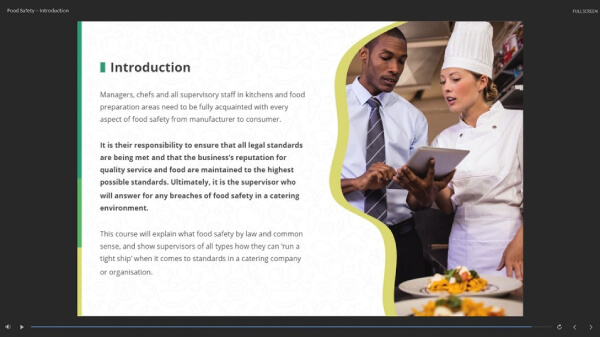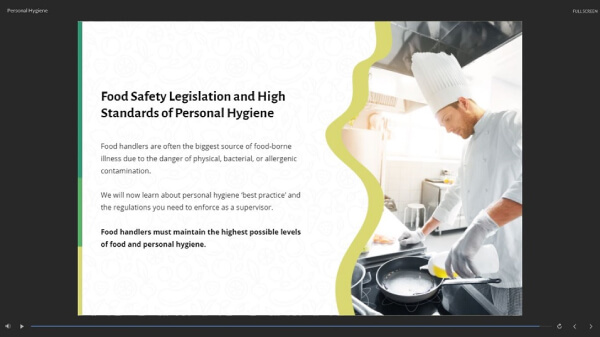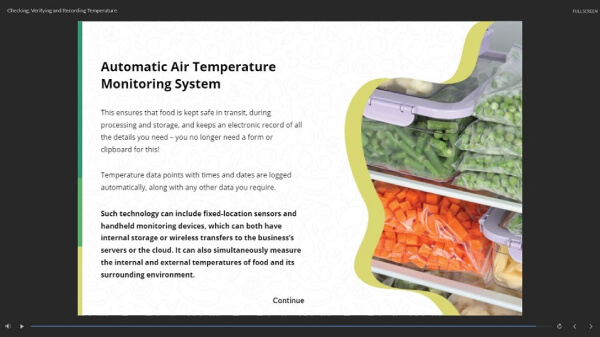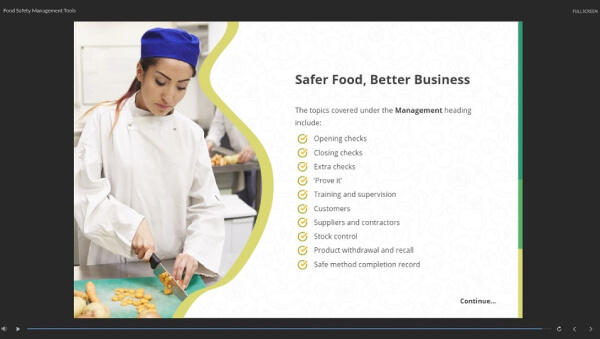GET THIS COURSE AND 1500+ OTHERS FOR ONLY £49 PER YEAR. FIND OUT MORE
Food Hygiene and Safety Level 3
This Food Hygiene and Safety Level 3 Course is designed to provide catering and hospitality sector professionals in senior-level roles with the skills, credentials and practical knowledge to ensure a high standard of food safety and hygiene in the workplace, in compliance with the Food Safety Act 1990.
All catering professionals must be trained in food hygiene and safety with a solid understanding of the risks and hazards involved in preparing and serving food. In this comprehensive course, learners will understand food hygiene best practice procedures in-depth. In addition, they will develop the skills to ensure their business achieves a five-star outstanding national hygiene food rating.
You will learn how to supervise food safety to effectively train your staff, implement and monitor an effective food safety management system. As a result, you can minimises the risk of food hazards, control contamination, maintain an excellent standard of personal hygiene, and much more.
- Institute of Hospitality endorsed
- Meets UK & EU legal requirements
- Instant e-certificate and hard copy dispatch by next working day
- Developed by qualified food safety professionals
- Self paced learning and laptop, tablet, smartphone friendly
- 24/7 Learning Assistance
- Discounts on bulk purchases
£28,900 Average Salary, Up to £43,700/yr for this skill according to top UK career sites.
Who Should Take This Course
This advanced Food Hygiene and Safety Level 3 Course is ideal for those in management roles who are responsible for supervising and training staff on food hygiene and safety standards, such as:
- Catering Manager
- Food Safety Manager
- Head Chef
- Health & Safety Advisor
- Restaurant Manager
- Senior food retailers
- Catering Manager
- Restaurant and Café owners
- Kitchen Managers
- Supervisory food handlers
- Supervisors or Managers of fast-food outlets and takeaways
Certification
Once you’ve successfully completed your Level 3 Food Hygiene and Safety Course, you will immediately be sent a digital certificate. Also, you can have your printed certificate delivered by post (shipping cost £3.99). All of our courses are fully accredited, providing you with up-to-date skills and knowledge and helping you to become more competent and effective in your chosen field. Our certifications have no expiry dates, although we do recommend that you renew them every 12 months.
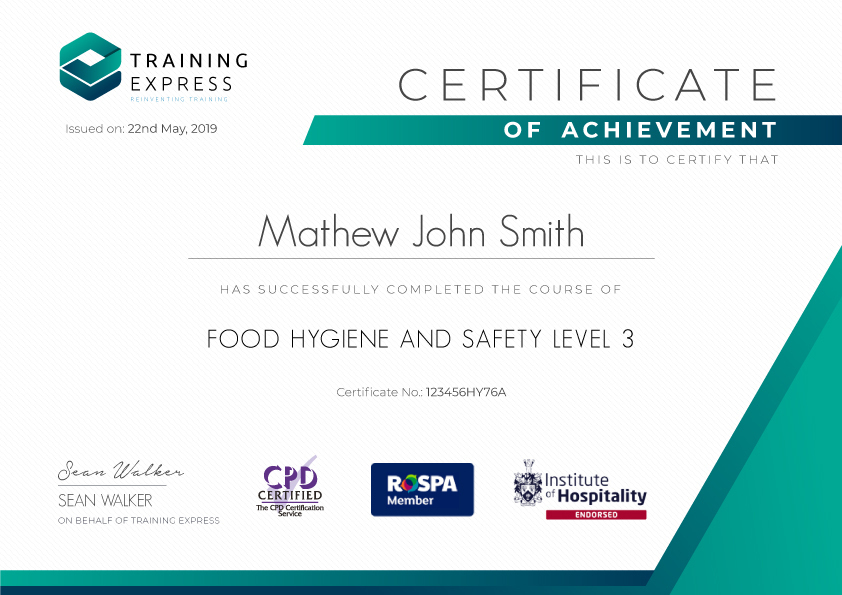
Learning Outcomes
By the end of the Food Hygiene and Safety Level 3 course, learners will be able to
- Demonstrate an in-depth knowledge of food safety in the catering industry
- Train, supervise and manage staff in compliance with UK food safety regulations
- Understand the fundamental principles of the Food Safety Act 1990
- Implement and maintain a solid food safety management system in the workplace
- Maintain excellent personal hygiene in the workplace and set a standard for all staff
- Understand the fundamentals of microbiology and food hazard control
- Know about temperature control and how to check, verify and record temperature
- Figure out how to avoid both bacteria and non-bacterial food poisoning and various food-borne illnesses
- Explore the best ways to preserve food and avoid food spoilage
Assessment of Level 3 Food Hygiene
At the end of the course, there will be an online assessment, which you will need to pass to complete the course. Answers are marked instantly and automatically, allowing you to know straight away whether you have passed. If you haven’t, there’s no limit on the number of times you can take the final exam. All this is included in the one-time fee you paid for the course itself.
FAQ
Yes, you can access the course through any smart device with Internet connection.
This course is designed with easy-to-follow and engaging video lessons.
After you successfully complete the course, you will immediately be sent a digital certificate. Also, you can have your printed certificate delivered by post in that case the shipping cost £3.99 will be added.
Course Contents
This introductory module will draw your attention to the world of food safety. You’ll learn about the food-borne illnesses and its causes, the vulnerable risk groups, and the key terms which will help you to understand food safety and its importance.
The food safety management system, HACCP and its fundamental principles, detail discussion of the implementation of HACCP, and HACCP based food safety management system – these are the keynotes of this module 4.
As the name suggests, this particular module is dedicated to giving you an overview of the key legislation, concerning authorities to enforce the law, code of practices, fines and prosecution, and due diligence.
The highlighted part of module is a vivid discussion on the various food safety management tools. Along with this, learners will also get to know about the management responsibilities and the importance of documenting the food safety system.
This module will tell you everything that you need to know about the roles and responsibilities of a supervisor. Along with the in-depth knowledge of supervisory skills and styles, you’ll also learn about food safety cultures, standards, food safety policies, and quality assurance & control.
In module 6, we’ll give you a tour of Microbiology. In this voyage, you will come across the detail of bacteria and factors responsible for its multiplication, moulds, yeasts, viruses, protozoa, and cyclospora.
From knowing the sources of contamination to understand the processes of detecting contamination – all will be discussed in module 7. You’ll also learn about various types of contamination hazards, vehicles of contamination, and cross-contamination.
This module will shed light on the control of different contamination hazards and the role of the supervisor in the prevention of contamination. Food storage, food preparation and cooking, and food service and delivery are some of the other key topics of this eighth module.
After a brief discussion on food poisoning, this module will draw your attention to the most common causes of food poisoning, food-borne illness, and food-borne viruses. Each of the topics will be discussed in detail.
In this module; you will learn about chemical food poisoning, metallic food poisoning, scombrotoxic fish poisoning, paralytic shellfish poisoning and diarrhetic shellfish poisoning, and the generic control measures for most food poisoning organisms.
In module, we will learn what a food allergy is, exploring the 14 major types of allergens, as well as the difference between food allergies and intolerances. It also provides essential information on how to treat anaphylactic shock.
In module, we will gain a deeper understanding of the different types of food allergens and how to read food labelling information. It also discusses allergen requirements for food businesses.
In module, we will explore food allergens in the vegan diet, with tips on how to order food and takeaways safely. It also provides guidance on how to create allergen-friendly meals at home.
This module will cover the wide area of food and temperature control. Some of the key topics from this module are safe temperatures, fridge & freezer temperature, cooking temperatures, and time without temperature control.
Module 13 will introduce you with the different equipment and process of measuring food temperature. You’ll also learn about when food temperature should be measured and the recording of temperature checks.
This module explains the common signs of food spoilage and prevention methods along with the different approaches to food preservation. Delivery and unloading of raw materials, wrapping and packaging, and stock rotation will also be discussed in this module.
The design, construction, and maintenance of food premises and equipment are essential for maintaining food safety. This module will tell how you can go with these factors to maintain the high standard of food safety.
Waste storage and the removal of waste, cleaning equipment, disinfection, and the procedures and methods of cleaning will be highlighted in this module. Learners will also familiarise with the in-houses and contract cleaning, and the role of the supervisor in cleaning.
The module will look at different types of pests, contamination caused by pests, and the standard control measures. A due-diligence defence and the role of the supervisor in pest control will also be discussed here.
In this module, you will learn about the general principle of food labelling that covers a range of topics, such as: food supplement, fortified food, alcoholic beverage labelling, and nutrition and health claims.
In this module, you will learn about different components of food labelling such as: food identity, ingredient lists, quantitative ingredient declaration, food additives, labelling allergenics ingredients, and date marketing.
This module will tell you about the high standards of personal hygiene, the relevant law and the role of the supervisor in personal hygiene. You’ll also learn about the hazards that come from food handlers.
This final module will draw the curtain on the course by explaining the importance of training for maintaining the high standard of food safety. You’ll also learn about the training methods and the role of management in it.
In the final module you will familiarize with all the new practices that have recently emerged to adapt to the new normal. You will learn in detail about the standard hygiene and safety practices needed to be followed to minimize the risk of contamination of COVID-19.
Course Curriculum
 TAKE THIS COURSE
TAKE THIS COURSE
£100.00£50.00 ex VAT- UNLIMITED ACCESS
- Level 3
- Course Certificate
- 12 hours, 33 minutes Gift this course
Subscribe to this course and 2,000+ top‑rated Training Express courses for your organization.
Try Training Express Business- For teams of 5 or more users
- 2,000+ fresh & in-demand courses
- Learning Engagement tools
- SSO and LMS Integrations
 Food Hygiene
Food Hygiene Health & Safety
Health & Safety Safeguarding
Safeguarding First Aid
First Aid Business Skills
Business Skills Personal Development
Personal Development






